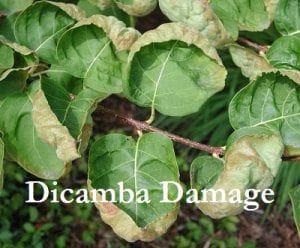 Farmers are suing Monsanto over Dicamba, an herbicide. Farmers in 10 different states are suing the biotech giant from Missouri for selling Dicamba seeds which the company knew could not be used without illegal spraying.
Farmers are suing Monsanto over Dicamba, an herbicide. Farmers in 10 different states are suing the biotech giant from Missouri for selling Dicamba seeds which the company knew could not be used without illegal spraying.Related: Monsanto Lawsuit
The farmers’ legal petitions state that Monsanto sold dicamba-tolerant cotton and soybean crops, while the company knew the sale would lead to illegal spraying. Dicamba is a highly volatile and drift-prone product.
Loraine Chow of EcoWatch reported that Steven W. Landers, et al v. Monsanto Company was filed on Jan. 26, 2018 in the United States District Court for the Eastern District of Missouri, Southeastern Division. The lawsuit was filed on behalf of Steven and Deloris “Dee” Landers, as well as farmers harmed by dicamba in 10 states – Alabama, Arkansas, Illinois, Kentucky, Minnesota, Mississippi, Missouri, North Carolina, Tennessee and Texas.
Negligence, Strict Liability, Failure to Warn, Conspiracy Claims
The farmer plaintiffs seek damages for claims that include negligence, strict liability, failure to warn, conspiracy, disgorgement of profits, and punitive damages.
Court documents state that Steven and Dee Landers have operated their family-owned farms in New Madrid County, Missouri, since 1976. The Landers claim their farms have been greatly damaged by the illegal spraying of dicamba on Monsanto’s Roundup Ready Xtend crops. These crops are genetically engineered to resist the toxic effects of dicamba and Monsanto’s Roundup (glyphosate). The problem is that neighboring farms and fields growing crops that are not genetically modified are also affected by dicamba drift.
EcoWatch
EcoWatch reported that the Landers’ 1,550-acre farm primarily grows soybeans and corn. In 2016, the farm suffered dicamba damage on more than half of its crops and acreage. That damage caused a marked reduction in crop yields.
Farmers in the lawsuit allege Monsanto knowingly marketed its Xtend cotton and soybean seeds to farmers without any safe herbicide being available to use on it. The lawsuit claims Monsanto knew the only option purchasers would have to protect crops grown from those seeds would be to illegally spray dicamba to protect the crops from weeds.
The farmer’s lawyers argue that, “Monsanto chose to sell these seeds before they could be safely cultivated. (Monsanto’s) own advertising repeatedly describes its Xtend seeds and its accompanying herbicide as a ‘system’ intended to be used together. But when Monsanto failed to get approval to sell the herbicide, it recklessly chose to go ahead and sell the seeds regardless.”
As a result, farmers throughout the country used illegal and dangerous herbicides in an attempt to protect the Xtend seeds.
The lawyers have argued that Mosanto knew inappropriate herbicide use would occur, the company even encouraged it, and the result was nationwide destruction of “hundreds of thousands of acres of crops.”
Monsanto’s Roundup
Dicamba is the new formulation of an old Monsanto herbicide (created ca. 1958). The company seems to have brought it back due to concerns over Roundup’s safety. In 2015, the World Health Organization declared glyphosate – Roundup’s main ingredient – to be a probable human carcinogen. Several Roundup cancer lawsuits have been filed against Monsanto since then, as Roundup is suspected of causing non-Hodgkin’s Lymphoma and other leukemia-type cancers. Many American farmers, as well as homeowners, have been diagnosed with leukemia after years of Roundup exposure.
Xtend System’s Troublesome Rollout
The Monsanto rollout of its Xtend system has been marked by trouble ever since Monsanto sold its Xtend cotton and soybeans several growing seasons before the company received federal approval for the herbicide needed for the system.
Farmers sue Monsanto over Dicamba
Monsanto introduced Bollgard II XtendFlex cotton in 2015, and Roundup Ready 2 Xtend soybeans in 2016. However, the U.S. EPA only approved the corresponding herbicide, XtendiMax with VaporGrip Technology, in late 2016. The new product combines dicamba and glyphosate. It is meant to address the proliferation of “superweeds” that have grown resistant to glyphosate. The emergence of resistant weeds has caused some farmers to move away from Roundup.
Dicamba Toxicity
The Cornell University web site says dicamba is moderately toxic by ingestion and slightly toxic by inhalation or dermal exposure. Symptoms of dicamba poisoning include loss of appetite (anorexia), vomiting, muscle weakness, slowed heart rate, shortness of breath, central nervous system effects (victim may become excited or depressed), benzoic acid in the urine, incontinence, cyanosis (bluing of the skin and gums), and exhaustion following repeated muscle spasms. Inhalation can cause irritation of nasal passages’ linings and the lungs, and voice loss. Dicamba is very irritating and corrosive. It can cause severe and permanent eye damage. Dicamba is also a skin sensitizer that may cause skin burns.
Related
- Monsanto Lawsuit
- Roundup Cancer Lawsuit

by Matthews & Associates




